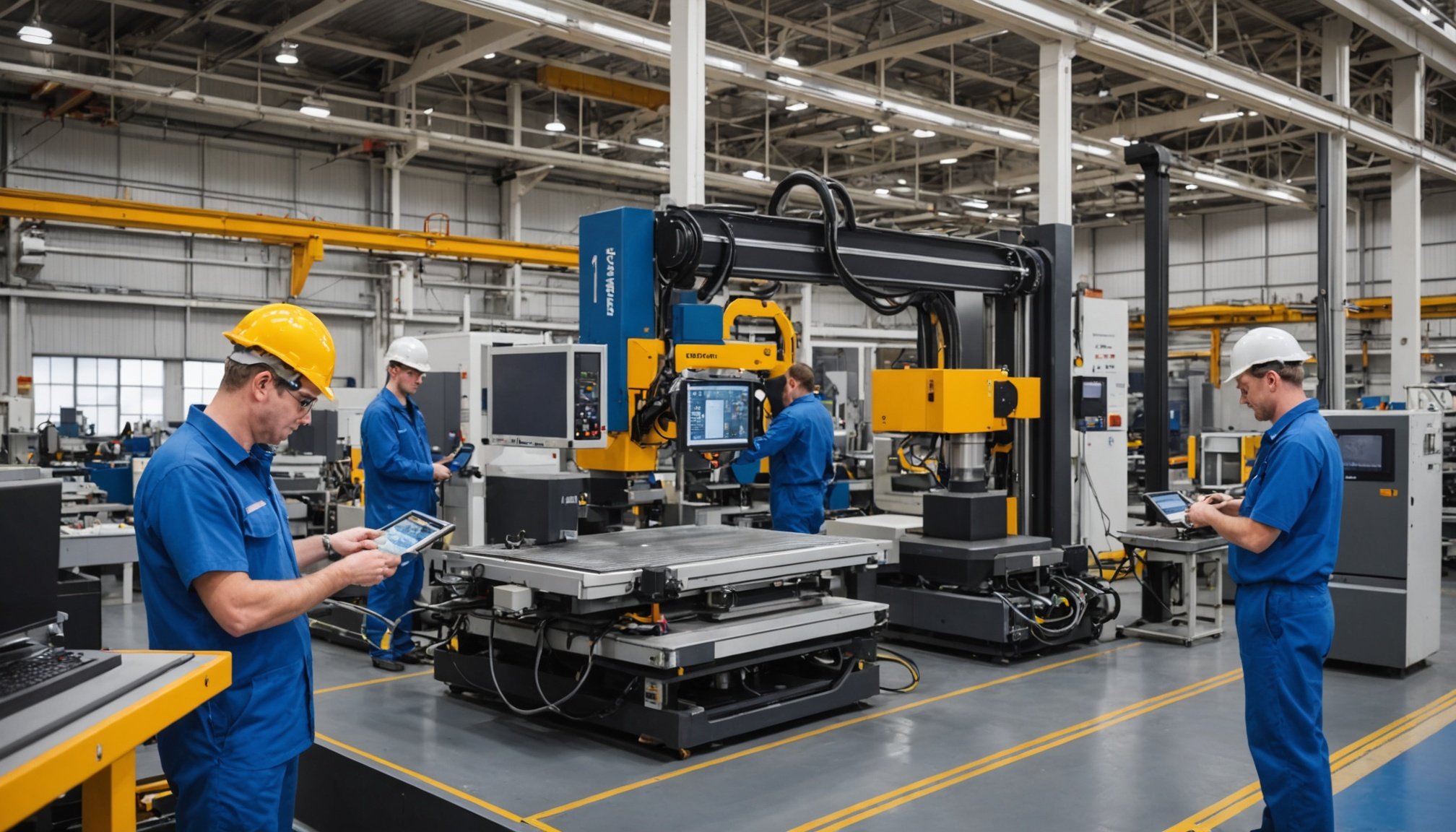Overview of Smart Factory Technologies
In recent years, smart factory technologies have revolutionised the manufacturing landscape, emerging as a cornerstone of Industry 4.0. These technologies integrate advanced systems such as the Internet of Things (IoT), artificial intelligence (AI), and robotics to enhance production efficiency and flexibility. A smart factory utilises data-driven insights to optimise operations, ensuring rapid responses to market changes and demand fluctuations.
The adoption of smart factory technologies in UK manufacturing is steadily increasing as industries recognise the need for enhanced competitiveness. The UK is aligning itself with global leaders in smart manufacturing by transforming traditional operations into digitally interconnected processes. This shift is crucial, not just for maintaining economic stability, but also for driving innovation and sustainability within the sector.
Several key drivers propel this adoption, including the demand for higher productivity and the necessity to diminish operational costs. The ability to predict maintenance needs through predictive analytics, thus minimising downtime, is a significant incentive. Additionally, the pressure to provide customised products swiftly is pushing industries towards these adaptive technologies. By incorporating smart factory technologies, UK manufacturers are not just optimising their current processes but also paving the path for future advancements in manufacturing efficacy.
Innovations in IoT for Manufacturing
The realm of manufacturing is witnessing transformative changes, largely due to the Internet of Things (IoT). Among its revolutionary elements are smart sensors, pivotal in creating enhanced production environments.
Topic to read : Unleashing innovation: advanced 3d printing techniques revolutionizing uk manufacturing
Benefits of IoT Integration
Integrating IoT applications within manufacturing processes offers substantial advantages. First and foremost, IoT harnesses smart sensors to provide real-time data analytics, improving decision-making and process optimization. This results in significant cost savings, reducing waste and enhancing resource management. Furthermore, these smart systems ensure seamless operations, predicting maintenance needs and minimizing downtime.
Real-World Case Studies
In the context of UK manufacturing, several companies have reaped rewards from IoT integration. Recognized leaders have implemented smart sensor systems to automate quality control, increasing efficiency by over 30%. Such IoT applications not only boost productivity but also foster innovation, setting benchmarks in their respective industries.
Challenges and Solutions
Despite its benefits, IoT adoption presents challenges, primarily concerning upfront costs and system integration complexities. Solutions include strategic investment plans focused on long-term benefits and collaborating with technology providers for customized IoT solutions. By overcoming these hurdles, manufacturers can achieve notable enhancements in operational efficiency and competitiveness.
The Role of Artificial Intelligence in Smart Factories
Artificial intelligence (AI) is revolutionising manufacturing processes by seamlessly integrating with smart factories. Machine learning algorithms are pivotal in enhancing these factories’ productivity by fine-tuning operations through continuous data analysis. Predictive analytics plays a crucial role in anticipating maintenance needs, thus reducing unexpected downtimes.
In terms of decision-making, AI provides manufacturers with the capability to make more informed decisions. By analysing vast quantities of data, AI systems can offer insights on improving efficiency and reducing waste. This shift towards data-driven decision-making is transforming traditional manufacturing operations, where gut instincts once led the way.
Looking to the future, AI-driven manufacturing is set to incorporate more sophisticated technologies. Advancements in AI and machine learning will pave the way for intelligent automation, reducing human intervention but increasing the need for skilled oversight. The potential for predictive analytics is vast; it will not only foresee maintenance issues but also optimise supply chains and production schedules in real-time.
The evolution towards AI-enabled factories promises a smarter, more efficient industrial landscape, characterised by enhanced performance and sustainable growth. Companies embracing these technologies are likely to gain a competitive edge in the ever-evolving market.
Automation Technologies Transforming Production
Advancements in automation and robotics are revolutionising manufacturing workflows, making processes more efficient and cost-effective. These technologies not only automate repetitive tasks but also enhance precision and flexibility in production environments.
Types of Automation Technologies
Several types of automation technologies are being implemented across industries. Robotics is perhaps the most prevalent, with robotic arms and machinery handling complex processes with ease. Another key technology is computer numerical control (CNC), which automates machine tools, enhancing precision and reducing human error. Automated guided vehicles (AGVs) are also becoming common, transforming logistics within manufacturing facilities by efficiently transporting materials.
Case Studies of Automation Success
Successful case studies exemplify the advantages of automation in production. For instance, a major automotive manufacturer integrated robotics to improve assembly line efficiency, achieving significant productivity gains. Similarly, an electronics firm adopted manufacturing workflows that cut production times in half, demonstrating how automation can bolster operational performance.
Addressing Workforce Concerns
Adopting automation raises concerns about the workforce. However, businesses are developing strategies for workforce adaptation. Upskilling initiatives and training programs are essential to prepare workers for advanced manufacturing workflows, ensuring a seamless transition as industries embrace new technologies.
Measuring ROI and Performance Metrics
When evaluating smart factory technologies, understanding ROI (Return on Investment) and performance metrics is crucial for decision-making. Companies often turn to key performance indicators (KPIs) to effectively gauge the efficiency of these technologies. Common KPIs include cycle time, defect rates, and manufacturing efficiency. These indicators provide insight into how well the technology enhances production processes.
ROI calculation is another essential element. Often, the equation involves assessing the initial costs against long-term benefits. This includes evaluating reduced operational costs, increased production rates, and overall manufacturing efficiency improvements. A simple technique involves subtracting the initial investment from the net return and dividing by the initial investment, then multiplying by 100 to get a percentage.
While some investments in smart factory technologies appear substantial, the long-term benefits cannot be overlooked. These might include sustainable practices, reduced waste, and heightened productivity. Initial costs may seem daunting, but the thorough assessment of performance metrics can highlight larger eventual savings.
Understanding the difference between long-term benefits versus initial costs allows stakeholders to make informed decisions, ensuring the technology truly aligns with business goals. By focusing on these critical aspects, companies can anticipate the overall impact and value generated from their investments.
Practical Tools and Resources for Implementation
When transitioning to a smart factory, utilising the right tools is imperative for success. Implementation tools, such as advanced software and IoT hardware, enhance operational efficiency. Tools like sensors and automation software are essential in monitoring processes and reducing human error, optimising production quality across different UK industries.
Essential Tools for Smart Factory Adoption
A variety of resources exist to aid in adopting smart manufacturing practices. From predictive maintenance software that ensures machinery is always functioning optimally, to interconnected devices that offer real-time data, these tools form the backbone of modern manufacturing.
Government and Industry Support
The UK government actively supports the manufacturing sector through initiatives and funding opportunities. These are designed to assist businesses in implementing innovative solutions and the necessary tools. Schemes often encourage collaboration between industries to drive technological advancements and sustainability in manufacturing.
Training and Development Resources
Effective implementation hinges on well-trained personnel. Numerous resources offer training and skill development opportunities crucial for workforce empowerment. By capitalising on these educational resources, UK manufacturers can ensure their employees are well-equipped to tackle the complexities of smart factory environments, bolstering productivity and innovation.











